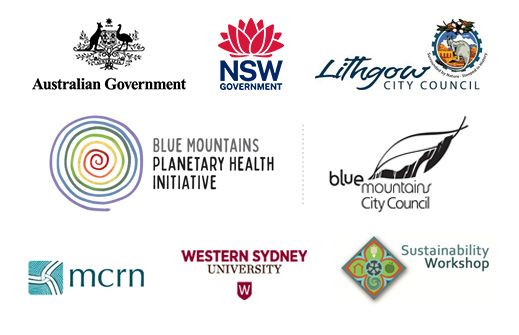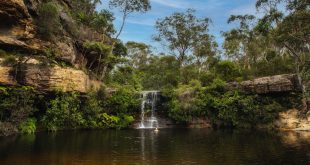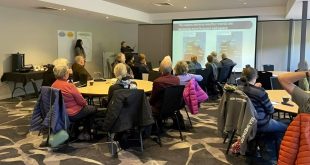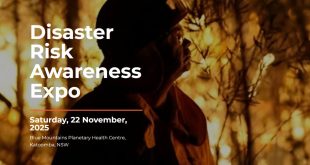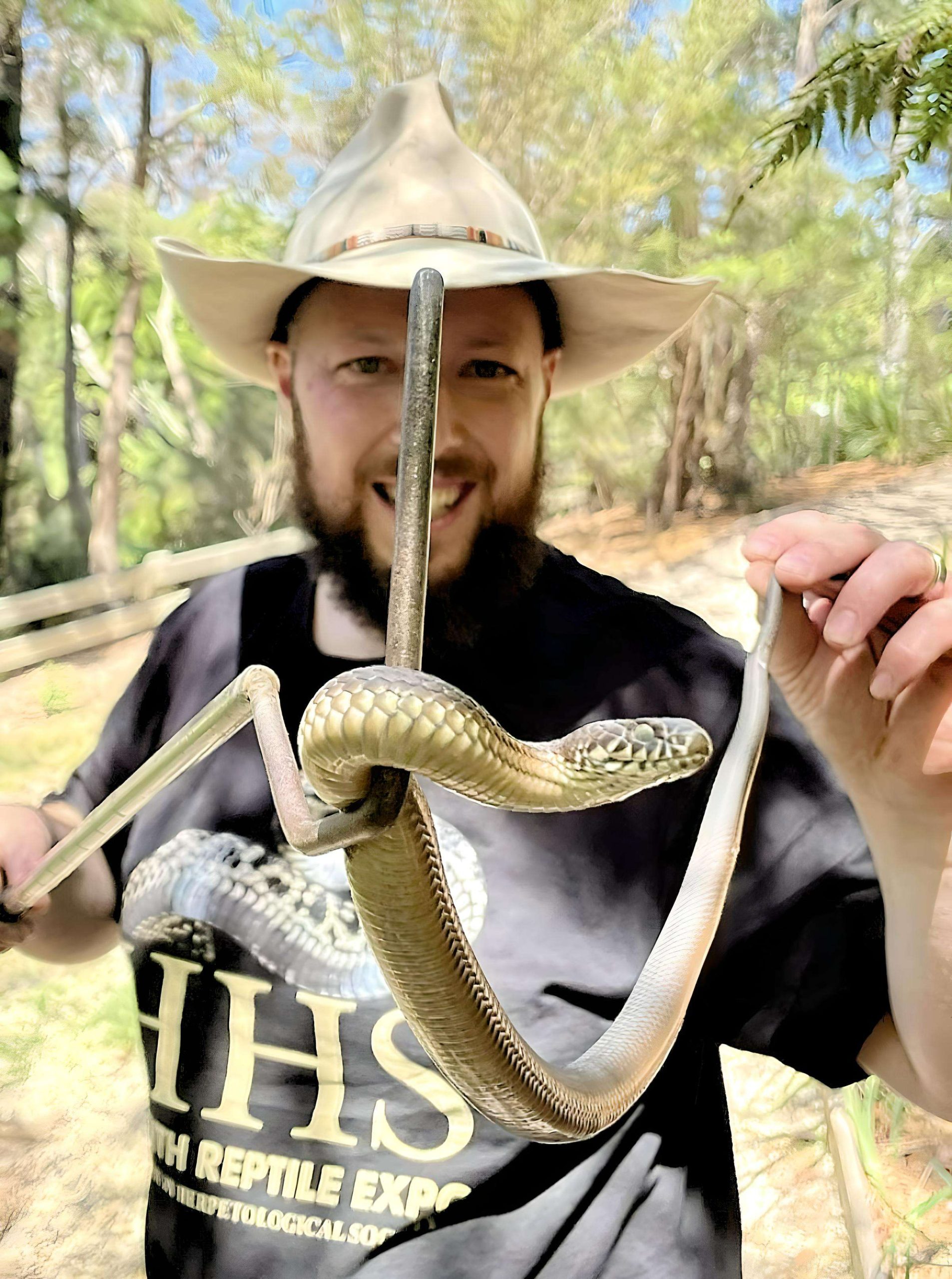
Troy Hovenden, ‘The Reptile Bloke’, relocates and safeguards suburban reptiles like this Highland Copperhead.
Story by Gabiann Marin
As our climate changes, bringing unseasonable weather events, we’re more likely to find wildlife, like snakes, in unlikely places, including our homes. Many greet snakes with fear, repulsion and sometimes violence. Local professional snake removalist Troy Hovenden wants to change the way we view these magnificent creatures, to help protect both human and snake residents of the Blue Mountains.
Key Points:
- Despite their fearsome reputation, even venomous snakes are rarely a threat to people. Snake bites usually are a result of the snake being provoked. By changing our attitude towards our native snakes we can create healthier and safer relationships which benefit both us and them.
- Snakes are an important and valuable natural predator and contribute to our ecological system in many ways beyond just keeping down rat and mice infestations.
- If you encounter a snake treat it with respect and caution, and if you need to have it removed from your property, Troy Hovenden, professional snake removalist, can ensure the snake is safely removed and relocated into a suitable bushland habitat.
“People think snakes will chase you, but this couldn’t be further from the truth. They usually don’t want anything to do with people.” Troy Hovenden, Blue Mountains resident Reptile Bloke says, matter of factly. “The only reason a snake would hurt you is if you try to catch or corner it or accidently step on it.”
Yet for many residents of the Blue Mountains, the thought of a snake in their backyard or in their home is terrifying. It conjures up images of vicious creatures rushing towards them, fangs bared and venom dripping.
“We have been taught to be afraid of snakes. To see snakes as aggressive, but most of what you hear or see about them is completely wrong.” Troy says. “I mean you have to be wise, you don’t want to go and approach a snake and get into a position where you are going to get bitten. But the truth is, most of the time, if you leave it alone it will just go away and never bother you.”
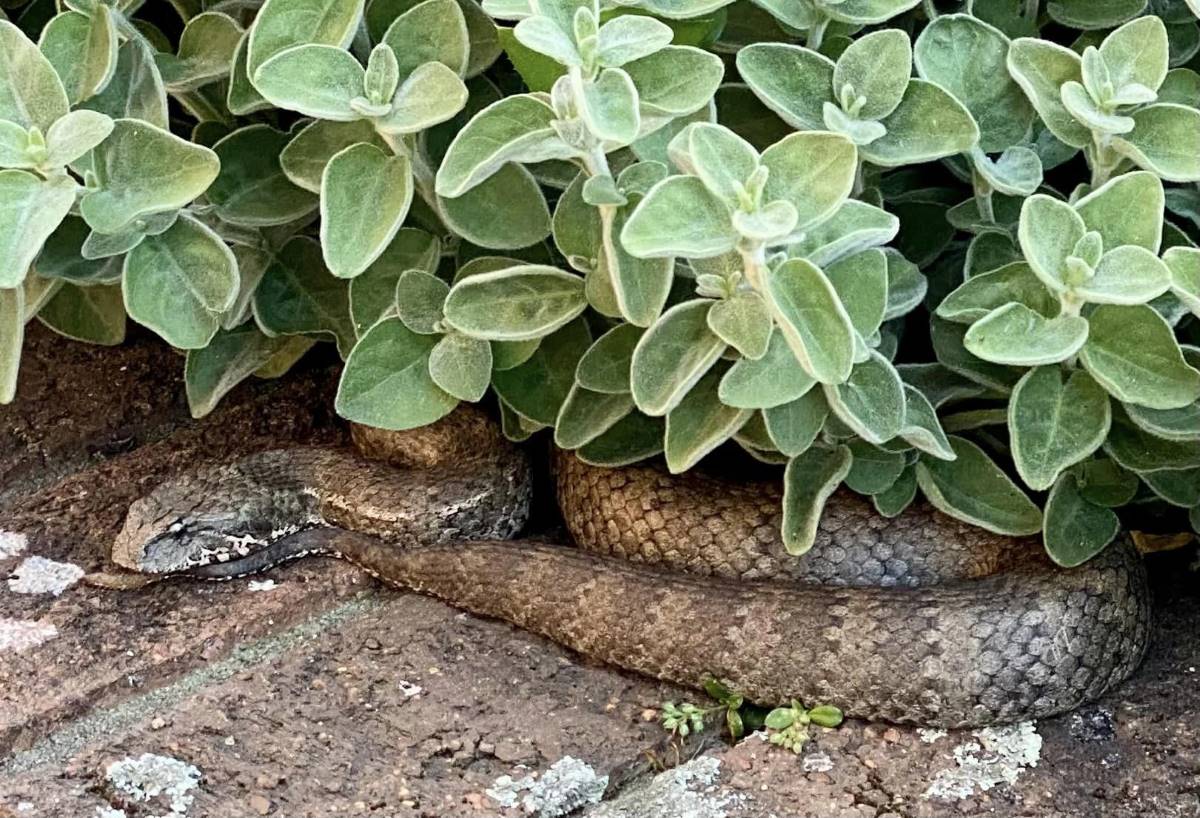
The unfortunately named Death Adder was originally named The Deaf Adder due to its habit of sitting completely still and not going on the attack, even as people moved all about it. (Photo: Troy Hovenden)
In 2016, Troy, in partnership with his wife, set up a snake removal business, The Reptile Bloke, which specialises in removing snakes found on suburban or bushland mountains properties, making sure the animals are safely released back into the bushland unharmed.
But Troy is more than just a businessman, he’s also an advocate for, and authority on, local Mountain snakes, and he wants to help change the way Mountain people respond to snakes in and around their homes, because these misunderstood reptiles are actually more likely to be harmed by us than pose any great danger.
“I started off as a WIRES reptile and snake rescuer,” Troy reveals. “I would often be called out, not because a snake was injured or in danger, but because someone had simply seen a snake on their back porch or slithering through their yard.”
Troy quickly figured out he could set up a business where people could call if they had a snake and wanted it removed, but didn’t want to call WIRES.
“It was a win/win because it saved a lot of snakes who might otherwise be attacked by frightened home owners, as well as helping to allay a lot of people’s fears,” Troy explains.
Since becoming a snake removalist Troy has seen first hand how debilitating the fear many people have around snakes can be.
“People mostly call me because they are afraid,” Troy explains. “Sometimes when they ring up they are hyperventilating, they are so stressed about the snake being there. So a lot of my job is calming people down and making sure they don’t do anything stupid.”
The ‘anything stupid’ is usually to take it upon themselves to capture or kill the unwanted snake. Something that Troy says can be a recipe for disaster.
“If you went up to some guy in a pub and tried to hit him in the back of the head or grab him, he’s gonna have a go at you. It’s a fair response really. So you wouldn’t do that,” Troy points out. “But for some reason a lot of people just can’t leave a snake alone, and that is what causes bites or attacks to happen.”
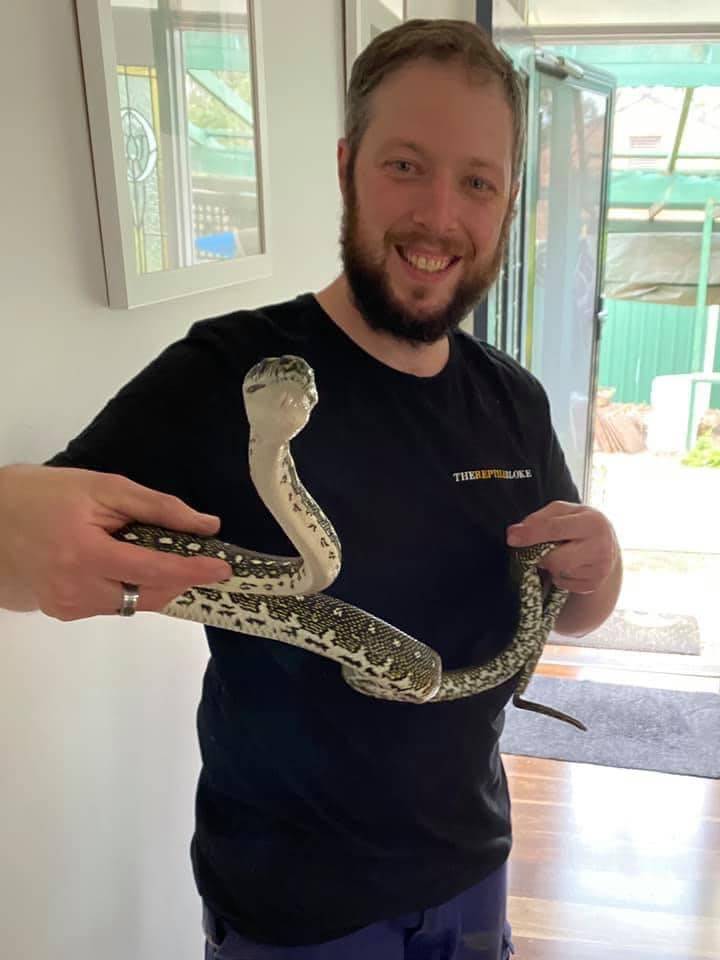
Troy Hovenden, Springwood’s Reptile Bloke, has a lifelong love of snakes and reptiles and does all he can to try and change the false and negative perception of these creatures. (Photo: Troy Hovenden)
Though The Reptile Bloke is a business that is there to help people, it’s fair to say that for Troy, the welfare of the snake is as important as providing some peace of mind to the person who has hired him. It is not unusual for Troy to find that it is the snake, and not the human, who is in real need of his help. As we urbanise the landscape, snakes can find themselves dealing with a lot of human-created challenges to their well-being, including garden netting, mesh fences, car engines and other man-made devices in which snakes can find themselves entangled or caught.
In a recent incident Troy was called out to help untangle a green tree snake from mesh fencing in Warrimoo and found, through displaying a calm demeanour and clear communication, he was able to not just save the snake, but also change the attitude of the property owners: from fear to fascination and then to a kind of empathy for the injured serpent. Watch Troy in action here:
This opportunity to educate the public as well as move the animals out of danger is the main reason Troy loves what he does, and he endeavours to never ignore a distress call from a human, or a reptile.
“I want people to see the snakes as I see them. They don’t deserve the hundreds of years of bad press that they have been given.” – Troy Hovenden
Of course, many people argue that the threat to human life justifies their fear response when a snake is seen slithering in a garage or curled up in a corner of a kitchen. But, while many Australian snakes are venomous, the incidence of actual bites is extremely rare.
On average there are 3,000 reported snake bites per year in Australia, with less than 3 deaths resulting. Statistically cows, horses and even kangaroos pose a greater threat to human life than snakes across the country. Studies are quick to point out that of those who did suffer snake bites, the vast majority occurred because the snake was threatened or mishandled by the bite victim, making most of those bites 100% preventable.
People aren’t just concerned for their own welfare though, with many Blue Mountains residents calling Troy because they are worried a snake poses a threat to their beloved family pet.
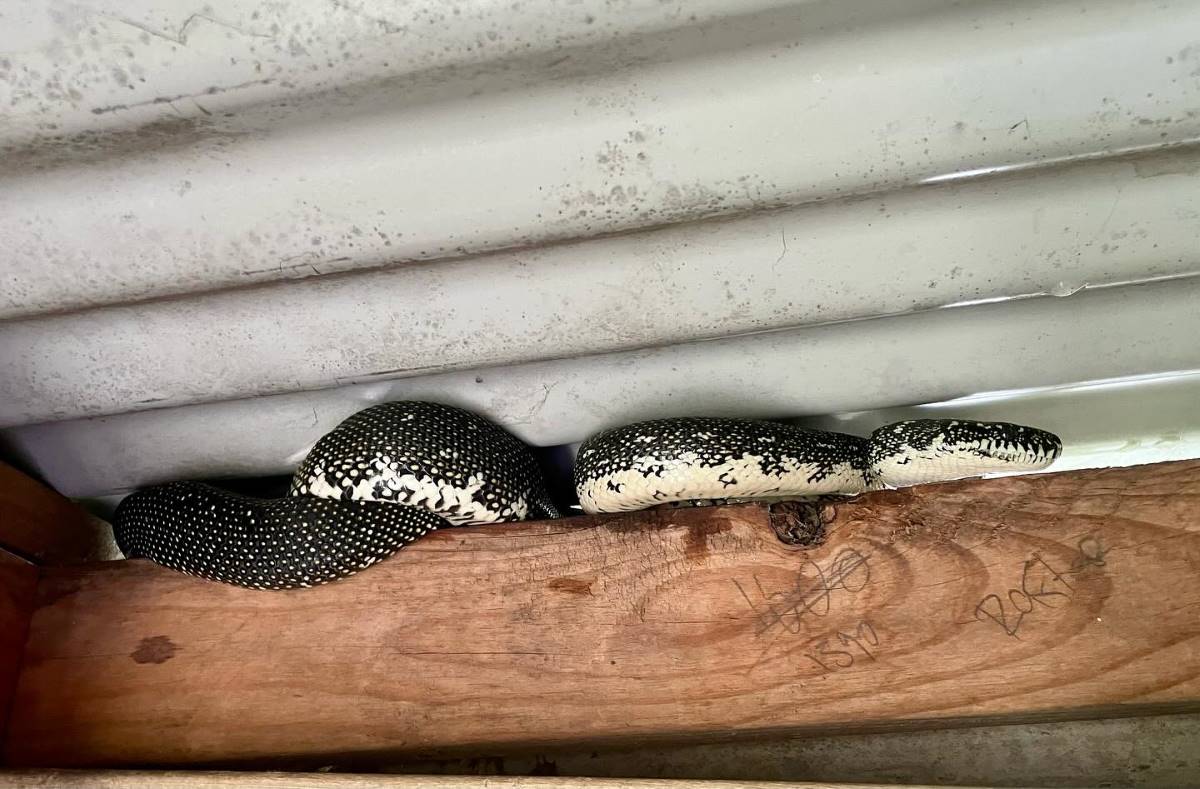
Diamond Python chilling out in a garden shed at Hazelbrook (Photo: Troy Hovenden)
“I get called out to a lot of Diamond Python sightings because people have heard stories of pythons eating pets. I have to remind them that those stories usually come from places where the python species are a lot bigger. Here in NSW our Diamond Pythons don’t grow large enough to swallow anything as big as a dog or cat, so I tell people to not worry, and just leave the snake alone and keep their pets away from it: but more for the snake’s safety because the dog actually has the upper hand on the python.”
While non-venomous snakes like the Diamond Python do not pose any real threat to most domestic animals, Troy acknowledges that the same is not true for venomous snakes, particularly Common Brown, Tiger or Red Bellied Black snakes, all of which are found throughout the Mid and Lower Mountains.
“Yeah, when it comes to venomous snakes it’s a different story. Red Bellies do, unfortunately, kill a lot of dogs.” But, Troy is quick to point out, this is usually because the dogs are the aggressors. “The dogs are usually playing with the snake, thinking it’s a toy, or attacking it because it is on their territory. So if I am called and there is a dog on the premises I will usually try to remove the snake before something bad happens.”
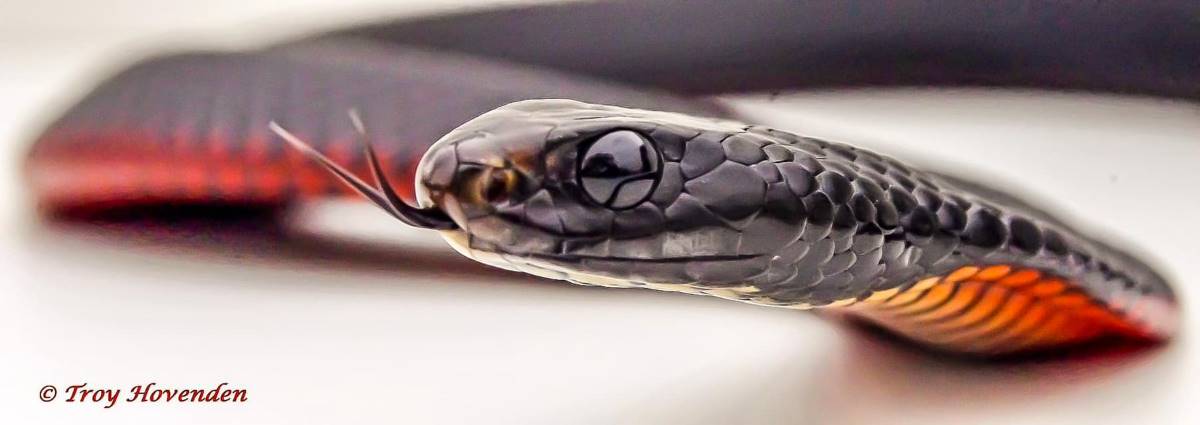
The threat posed to pets by Red Bellied Back Snakes can be greatly reduced by preventing dogs from attacking or chasing after snakes in bushland or residential areas. (Photo: Troy Hovenden)
Snake removal is also recommended if the snake is in an area where there is a lot of foot traffic, where children are likely to engage with it or there are hazards to the snake itself. Troy stresses that snake removal can be dangerous and it is essential to call in a professional.
“Most people, even those who are familiar with snakes and reptiles, wouldn’t be able to correctly identify a snake from any kind of distance, and each snake needs to be handled in a different way. Most will run away but some will move towards you if cornered and may bite if they feel threatened. The best thing to do, in the majority of cases, though, is to just leave the snake alone and wait for it to remove itself.”
This advice to not remove or relocate a snake unless absolutely necessary may seem an odd contradiction for a man who makes his living as a snake remover. But Troy just shrugs. Despite this advice, there are more than enough people who will still insist on having the snake taken away, and Troy is kept very busy, particularly during the peak times of Spring and early Summer, capturing and relocating snakes into nearby bushland areas.
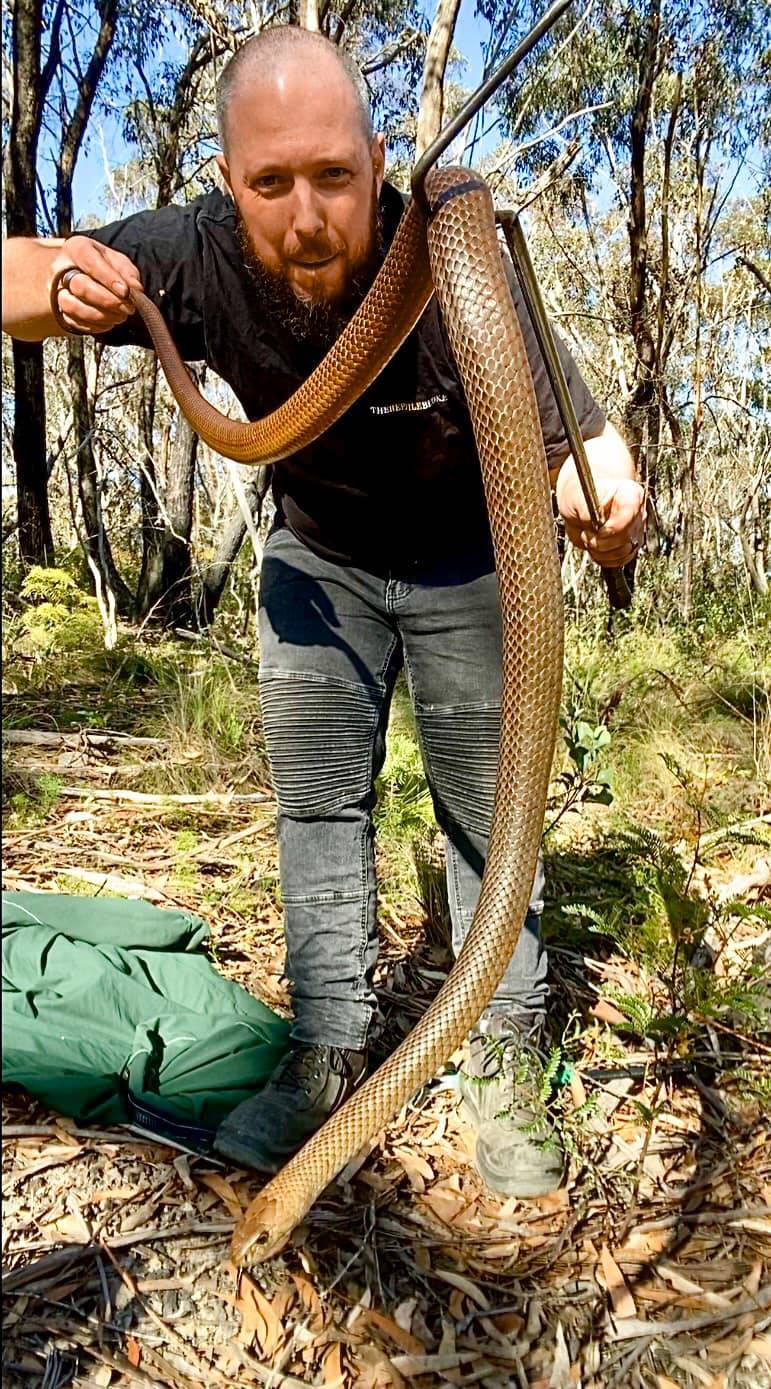
After removal Troy always makes sure that a snake is returned unharmed to the nearest appropriate bushland area. (Photo: Troy Hovenden)
“People usually want me to take it a million miles away, but that’s not a good idea. I can remove it from their property, but then I have to think about the snake’s welfare as well. I have to find a suitable place, and the further away you take a snake from where you catch it, the less likely it will survive.”
Aside from the benefits for the snake, though, Troy believes it is beneficial for humans to leave snakes to live undisturbed in our nearby bush and even our very own backyards, because snakes can actually be really valuable and productive neighbours.
“I would rather have a python living in my roof than rats or mice. A python is quiet and clean, you probably wouldn’t even know it was there. Rodents eat through your wiring and leave a mess. They spread disease. The python is a much better option.” Troy smiles.
Recent studies support Troy’s belief that snakes are helpful to have around. Not only do they provide chemical-free pest control, ridding our homes and local areas of rats and mice, they are ecologically vital to ensure local ecosystems remain healthy and stable, benefiting all our native flora and fauna.
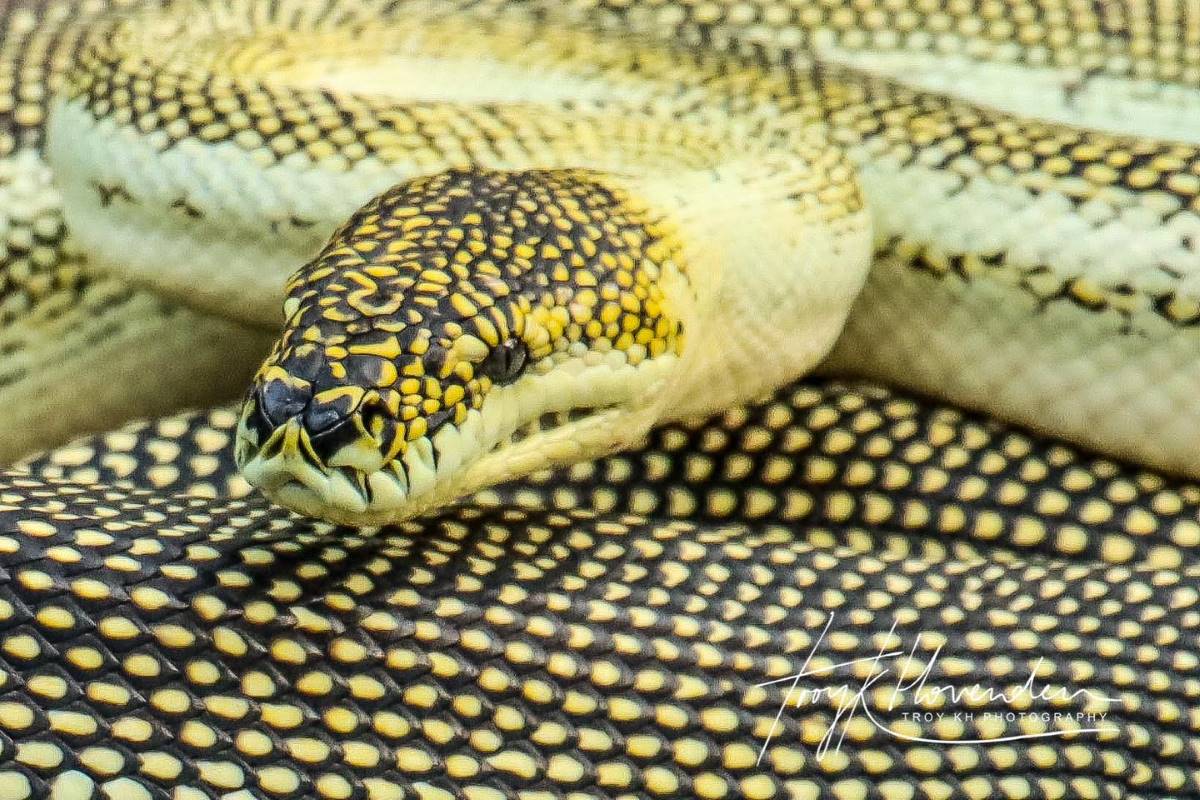
The Diamond Python is a wonderful, ecologically-safe pest controller who removes vermin from our suburban areas, as well as acting as an important stabilising predator in the natural ecosystem. (Photo: Troy Hovenden)
So, next time you see a snake, rather than react with fear and loathing, take a minute and reassess the centuries of anti-snake information you have heard and try to see these magnificent and necessary creatures as the invaluable eco warriors they are. In that way perhaps we can all start to forge a new, safe and respectful relationship with these wonderful and beautiful creatures.
If you see a snake:
- Leave it alone.
- Keep children and pets away from the area where the snake has been spotted. A quiet, respectful attitude is likely to ensure that neither snake nor human nor pet becomes hurt or injured.
- If it is in your house or some other indoor area, leaving exterior doors or windows open will usually encourage snake visitors to find their own way out.
- If you need a snake removed or find an injured snake, do not approach it and never attempt to pick up a snake, even if you think it is incapacitated. Phone or text Troy Hovenden The Reptile Bloke on 0404 109 421 or WIRES on 1300 094 737 to safely remove and care for the snake.
Protecting Pets:
If you are concerned about your pet’s safety around snakes:
- Keep your pets inside and away from areas where snakes could be, such as overgrown or dense bushland areas,
- Avoid taking your dog into bush areas during prime basking times, usually mid afternoon or mid morning in Spring and early Summer
- Keep dogs on leads in bushland or overgrown areas. Even the most sociable dog may react negatively to snakes and, although in most cases the snake will try to retreat, if cornered it can leave a nasty and potentially life-threatening bite.
- Enrol your dog in one of several speciality snake avoidance training courses, which focus on discouraging dogs from hunting, chasing or interacting with snakes in their territory. These courses are offered intermittently throughout the year. Some upcoming courses include Sydney based workshops Snake Aversion Training and mini courses with the Dog Lady Debi Coleman in Orange NSW
Share this article:
This story has been produced as part of a Bioregional Collaboration for Planetary Health and is supported by the Disaster Risk Reduction Fund (DRRF). The DRRF is jointly funded by the Australian and New South Wales governments.
